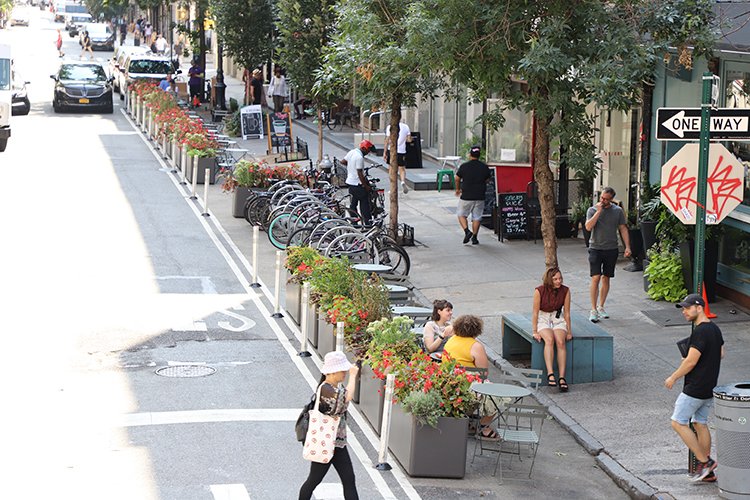Big Wins in the Making New York Work for Everyone report
New York City took a significant step forward Wednesday morning when the New New York panel released its Making New York Work for Everyone report. In the tenor of the report and many individual commitments, Open Plans’ impact is clear. The panel’s plan for economic recovery takes a people-first approach, employing livability solutions to drive growth and wellness. Many of the items represent the first time we’re seeing the City commit to strategies we’ve been proposing for months or years.
We’re enthusiastic and encouraged, but there’s a long road ahead. We’ve thought about that, too, and have detailed and practical plans for implementing many of the items listed in the report, like curb reform, public space management, and parking mandates. The next step will involve collaboration from every decision maker in New York City. We’ll be there every step of the way.
Make Open Restaurants permanent
The Open Restaurants program represents a dramatic shift in our approach to curb space, and it has paid dividends. Reactivating underutilized car-storage spaces for dining and commerce has been an economic lifeline for many small business owners. Open Plans has advocated for permanent and well-managed curbside dining since the program’s inception (“Keep outdoor dining, but make it work better,“ Daily News, 2021). Making the program permanent, year-round, and curbside will offer the greatest impact for our neighborhoods and business owners.
Appoint a first-ever Director of the Public Realm
Open Plans has been calling for central Public Space Management leadership since 2020. Our public spaces - streets, sidewalks, plazas and parks - are underutilized and unmanaged. Often, public space management is foisted on volunteers and overburdened community leaders. But New York City should not be outsourcing the care of some of its greatest assets. Public space can play a role in economic recovery, improved health, climate resilience, and connectedness. But we need a strong vision, and a bold leader, to get there. We’re co-leading a diverse coalition of public space stakeholders, and we look forward to continuing that work with a commitment from the City to fulfill a key piece of our proposal.
Commit to strategic maintenance of public spaces
Public spaces should be considered essential to the health, wellbeing, and vitality of New York City. And our streets and curbs need stewardship to ensure they are free from mountains of trash, swarms of rats, and splatters of dog poop. The choice to care for public spaces is an obvious one, providing New Yorkers a clean, safe, and healthy place to play is a no-brainer. Especially considering that New Yorkers have flocked to plazas, open streets, and block parties during the pandemic.
Expand Open Streets program
Anecdotally, it’s clear that Open Streets create vibrance and culture; DOT’s Streets for Recovery report has the data to prove that. Businesses that operate along Open Streets do better, and have recovered faster, than businesses with car-free space. New York City should be harnessing this power to boost business and attract New Yorkers. But, as we’ve warned, Open Streets need support to thrive. In order to make an expansion sustainable and equitable, the City must invest in Open Streets and the people who manage them.
Enliven public space with cultural programming
Programming is the backbone of so many public spaces. It helps provide meaning to why someone would want to stop and linger on their way home from work or school, why a young child would want to wiggle to the fun music played on the plaza. Without programming many public places are sad and lonely. This is an immediate, easy solution that will bring joy to all New Yorkers.
Increase bus speeds
New York City has some of the slowest buses in the nation. Reliable transportation is fundamental to a just economic recovery. Access to transportation has been shown to be one of the most important indicators of economic mobility. Sitting on buses that crawl past double parked vehicles and backed up in traffic won’t cut it. We can increase bus speeds with bus lanes, like 14th Street, and automated enforcement.
Reform curb management
Many of the commitments in the report - bus service, bike infrastructure, Open Restaurants - will hinge on comprehensive reform of our curbs. We need to reimagine the way we allocate our curb space. A future plan should prioritize uses that serve the most people, including loading zones, dining, and transit. Curb management, in turn, will be essential to a successful reform. Management tools like camera-based enforcement and priced curb parking will ensure the curb reforms are effective and long-lasting.
NYC DOT
Develop protected bikeway infrastructure and bike storage
Safe, reliable bike infrastructure is essential to reducing vehicle miles travelled, reducing death and injury, and increasing equitable mobility across the city. Right now, we ask our cyclists to navigate far too much danger from cars, blocked lanes, and deteriorating infrastructure; we need to provide this rapidly growing demographic with the same level of amenities car drivers have felt entitled to for decades.
Firmly support congestion pricing
Congestion pricing is long overdue. Amidst an impending MTA funding crisis we need the money to fund our subway system. It is that simple. Our city can’t operate without the subway system and not implementing congestion pricing as soon as possible is unacceptable. Less vehicles in the tolling zones will also reduce traffic congestion and increase air quality as well as make our streets safer.
Remove/reduce parking minimums citywide
Parking mandates reduce the amount of affordable housing built, contribute to the climate crisis, and deepen our reliance on cars. As a part of its larger initiative to amend our zoning code, the City is weighing its options for parking mandate reform. While it’s positive that the City is prioritizing parking reform, it’s vital that we eliminate all parking mandates citywide, and not just expand the transit zone. To reach our housing, climate, transit, and equity goals, we must eliminate parking mandates.



